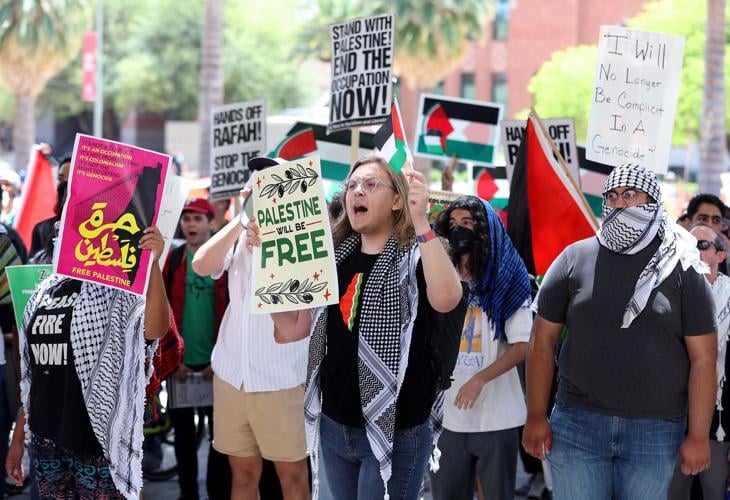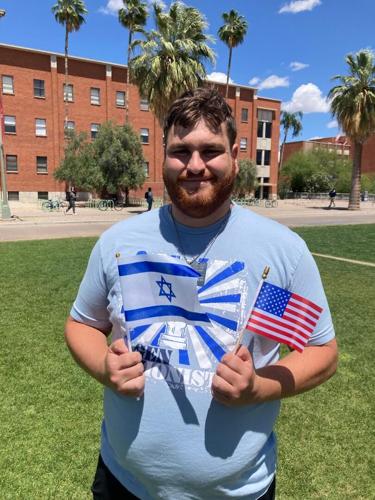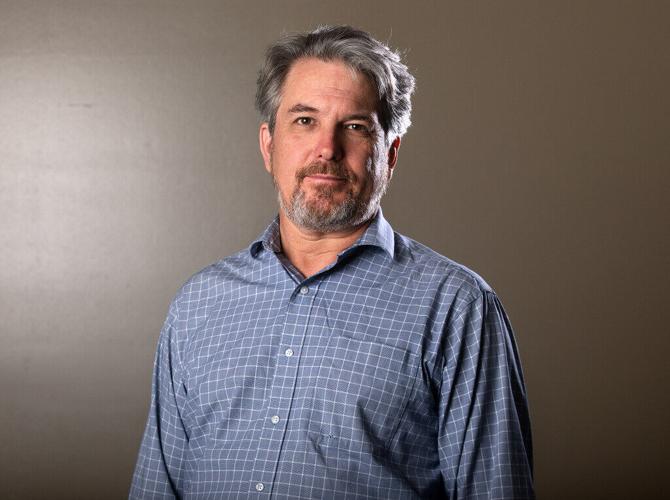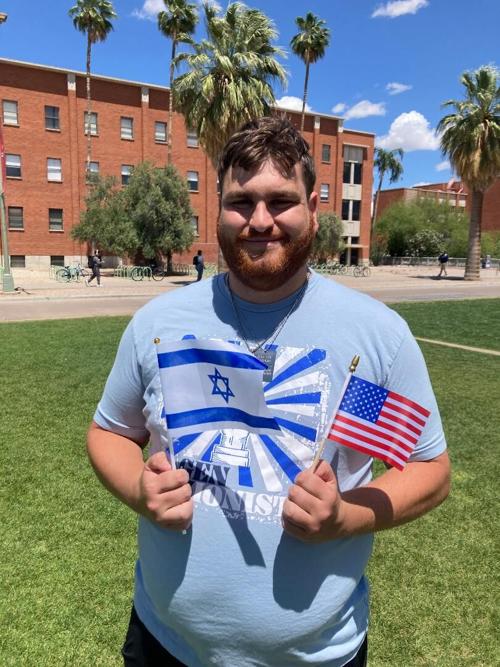Over and over Thursday, a crowd of protesters on the UA campus chanted the contested phrase.
“From the river to the sea, Palestine will be free.”
Still, the pro-Palestinian protest and march played out without many problems, bringing in 200-300 attendees, resulting in no arrests and leading to just a few arguments between protesters and counter-protesters bearing Israeli flags.
Police were barely visible and ended up being unneeded. In that sense, the event reflected the state of the UA campus during current high tensions over the war in Gaza: It’s tense, yes, but overall it’s been tolerant enough to be tolerable.
That’s of course not been true for campuses around the country. At ASU Friday, police tried to prevent students from setting up a protest camp, something the UA students did not try, and arrested three people, then arrested another 69 overnight.
Across the country, university administrations have been calling in the police to break up pro-Palestinian protests and camps.
The lines are often hard to draw between what is protected speech and what is prohibited by either university codes or criminal laws. That phrase “from the river to the sea” sits somewhere near the line, representing a genocidal threat to some and a call for liberation to others.
But what’s been frighteningly clear this week is the willingness of some administrators and politicians to crack down on the expression of political opinions they oppose or are being pressured to stifle. This was nowhere clearer than at the University of Texas in Austin.

Protesters stand and shout near the Student Union Memorial Center on the campus of the University of Arizona on April 25 as part of the UA chapter of Students for Justice in Palestine’s Israeli Apartheid Week, which, besides the protest, included panels and informational sessions about the conflict.
There, police crashed a peaceful protest calling for divestment of the university from companies supplying weapons to Israel and arrested dozens, some of them violently.
Texas Gov. Greg Abbott applauded the arrests. “Antisemitism will not be tolerated in Texas, he said via X, the former Twitter. “Students joining in hate-filled, antisemitic protests at any public college or university in Texas should be expelled.”
The heart of the argument
This, of course, is the crux of the claim by those trying to suppress these protests. A sort of groupthink has taken over American leaders, suddenly arguing that these protests are all antisemitic, ignoring the many Jewish participants.
Certainly antisemitism has come out in some demonstrations and on some campuses, but the thrust of this movement has been protesting the actions of the state of Israel in Gaza. It’s about a war — yes, responding to the Oct. 7 attacks by Hamas that killed 1,200 Israeli civilians — that has killed more than 13,000 Palestinian children, made about half the homes in Gaza unlivable and led to starvation.
Eliding that difference, making it seem that any protest against Israel’s actions is antisemitic, has been the key to unleashing this crackdown.

Arizona Daily Star columnist Tim Steller
It also seems to be part of an opinion campaign being waged internationally, even by the prime minister of Israel himself. In a galling video he put out Wednesday, Benjamin Netanyahu said the protests in the United States are “reminiscent of what happened in German universities in the 1930s.”
“What’s happening in America’s college campuses is horrific,” Netanyahu said. “Antisemitic mobs have taken over leading universities. They call for the annihilation of Israel. They attack Jewish students. They attack Jewish faculty.”
It was an outrageous statement for a variety of reasons, mostly because it was exaggerated at best, untrue at worst, but also because it attempted to redefine protests that are mostly about his government’s actions. Beyond the apparent attempt to bend American political opinion to benefit himself, a corrupt aspiring autocrat, Netanyahu’s statement was particularly egregious coming on the same day President Biden signed into law $26 billion more in U.S. aid for Israel.

Protesters carrying Palestinian flags marched past the USS Arizona memorial on the University of Arizona campus Thursday, April 25.
We who live in the country that supports Israel generously with our own tax money certainly retain the right to protest its actions. We have that right in any case.
Words viewed differently
But do we have the right to chant “From the river to the sea, Palestine will be free” on a college campus?
The slogan is viewed differently by different people. I spoke for some time after the protest Thursday with a Jewish UA junior named Edan Levy who gathered with a group of students holding Israeli flags and other identifying regalia.
“Our main purpose is to show our presence and to show that Jewish students on campus side with Israel,” he said. “We want to be available to be a calm, uninflammatory presence on campus that allows students to come and engage with us.”
Levy’s parents are from Israel, he said, and he has many more relatives there. The chant bothers him.
“If you really understand what the phrase means, it means the mass displacement or mass genocide of Jewish people in the land of Israel,” he said.
“Do I believe that everyone in this protest now actually does believe that? No, I think some of them have been pushed by propaganda or are riding the trend of performative activism.”
Typically, Americans who use the phrase argue that this is not what it means to them. They view it as a call for the liberation of Palestinians under occupation from the Jordan River to the Mediterranean Sea, especially in the Israeli-occupied West Bank and Gaza. The intent is open to interpretation.
Naive or sinister
As I watched the protest Thursday from a second-floor bridge at the student union, a woman sidled up to me and said “If they did this in Gaza, they’d be shot.”
That sort of perspective, I think, is important to remember. I suspect that some pro-Palestinian campus activists are naive or sinister, gliding from protesting Israel’s war actions to supporting Hamas as “resistance” to Israel.
If the protesters really want freedom for all, as they said they do Thursday, they can’t support totalitarians. They can’t support Hamas or their ilk. They can’t ignore the way Hamas provoked the Israeli attack and contributed to the deaths of thousands of Palestinians.
If they really want freedom, protesters also cannot attempt to control public space by deciding who enters their camps and who interviews who, a common and illegal practice at these protests.
But those of us who claim to support freedom also shouldn’t tolerate totalitarian actions like Netanyahu’s efforts to undermine Israel’s judicial branch or the flimsily justified crackdowns on protests in the USA. At Ohio State University, police stationed snipers on the rooftops as they arrested peaceful protesters Thursday night.
This sort of lusty viewpoint discrimination should be impossible on Arizona campuses. In the late 2010s, the Legislature declared the state’s university campuses to be free-speech zones and stated that “It is not the proper role of an institution of higher education to shield individuals from speech protected by the First Amendment, including, without limitation, ideas and opinions that may be unwelcome, disagreeable or deeply offensive.”
No laws broken
What’s much cleaner and more constitutional than busting up protests is to respond to clear threats or other behavior that violates laws or campus policies. Someone recently wrote graffiti — the question “What side of history will you be on?” — on the wall of a Jewish fraternity at the UA. That should be investigated and punished. Setting up overnight protest camps on college greens can be a solid justification to step in, depending on the school’s codes.
Chanting an ambiguous chant cannot. Which is why it was a relief to hear Sgt. Andrew Valenzuela of the University of Arizona police explain his department’s approach Thursday.
“We were monitoring the event closely,” he said. “We’re here to see that everyone’s rights are protected and that things go peacefully. We didn’t effect any arrests, because there weren’t any laws broken.”
That’s the way it ought to be, no matter what opinions powerful people try to restrict or impose.
Students and Tucsonans gathered to protest at the University of Arizona to free Palestine. Video by Tim Steller, Arizona Daily Star







